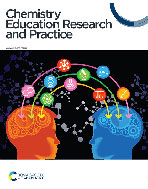Students’ interactive engagement, academic achievement and self concept in chemistry: an evaluation of cooperative learning pedagogy
Abstract
This study evaluated the effectiveness of interactive engagement pedagogy, specifically, cooperative learning pedagogy in improving students’ academic achievement and academic self-concept in chemistry. A pre-test, post-test, non-equivalent, control group quasi-experimental design was adopted. The study was in senior secondary schools in one of Nigeria's North-central states. The focus was on senior secondary school class two (SS2) students of comparable academic abilities and a mean age of 15.42 years. The sample was 244 students. The chemistry achievement test on water (CATOW) and students’ academic self-concept questionnaire (SASQ) were the instruments used in data collection. The CATOW was validated by experts while the SASQ was an adapted instrument that was already validated. The reliability coefficients were 0.82 determined with Kuder–Richardson's formula 20 for the CATOW and 0.78 determined with Cronbach's alpha for the SASQ. Mixed methods of data analyses were employed in the study, involving mean, standard deviation, analysis of variance, independent sample t-test, analysis of covariance, and Pearson's correlation statistics. The results show that interactive engagement pedagogy (cooperative learning strategy) improved the academic achievement and academic self-concept of the students in chemistry more than the conventional (lecture) method. The study also found a positive linear relationship between academic achievement and the academic self-concept of the students in chemistry. The implication was for the chemistry teachers in developing nations to structure the learning environments to be more learner-centered, and activity-based by creating cooperative and collaborative learning platforms that will help in improving students’ academic achievement and self-concept. The study recommended that chemistry teachers desist from using teacher-centered pedagogies for lack of provisions for students’ active engagement in the teaching–learning process. This study is novel because it evaluated the effectiveness of interactive engagement pedagogy (cooperative learning) in improving students’ academic achievement and self-concept in chemistry in a developing nation and also identified some of the reasons for the lack of implementation of innovative pedagogies and possible remediation in developing nations, especially in Africa.


 Please wait while we load your content...
Please wait while we load your content...